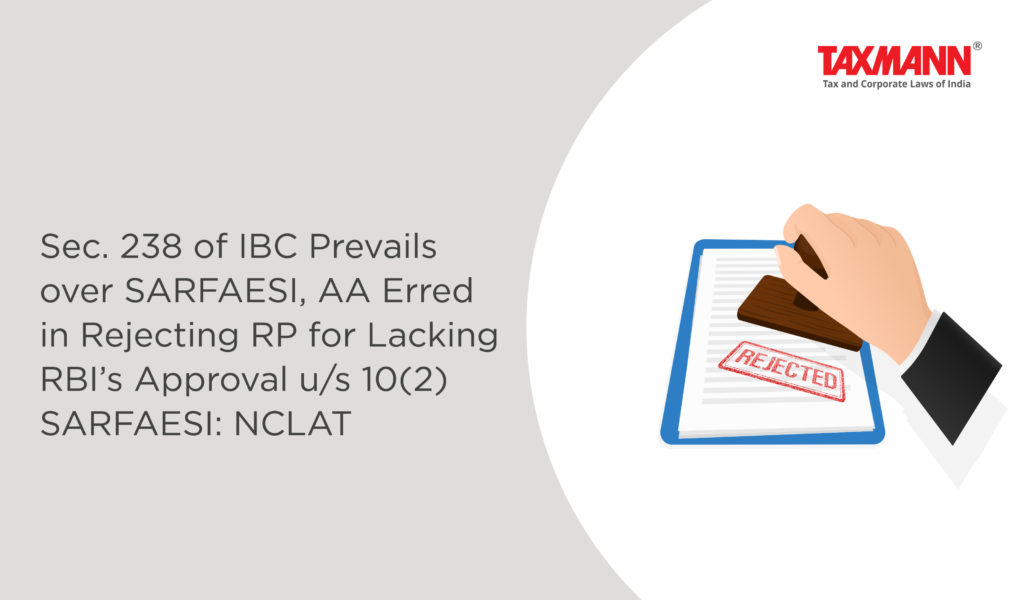Sec. 238 of IBC Prevails over SARFAESI, AA Erred in Rejecting RP for Lacking RBI’s Approval u/s 10(2) SARFAESI: NCLAT
- Blog|News|Insolvency and Bankruptcy Code|
- 2 Min Read
- By Taxmann
- |
- Last Updated on 16 June, 2023

Case Details: Puissant Towers India (P.) Ltd. v. Neueon Towers Ltd. - [2023] 151 taxmann.com 213 (NCLAT-Chennai)
Judiciary and Counsel Details
-
- M. Venugopal, Judicial Member & Ms Shreesha Merla, Technical Member
Facts of the Case
In the instant case, the Committee of Creditors (CoC) approved a resolution plan with a 98.70% majority. The Resolution professional (RP) filed an application before the Adjudicating Authority (NCLT) for the approval of the resolution plan.
However, the same was dismissed on the ground that one of the resolution co-applicants being an Asset Reconstruction Company (ARC), the resolution plan could not have been submitted without the prior approval of the Reserve Bank of India as per section 10(2) of SARFAESI Act, 2002.
Thereafter, an appeal was filed with the National Company Law Appellate Tribunal (NCLAT) against the order passed by the NCLT.
The appellant argued that the ARC did not require prior approval of the RBI to participate as a resolution co-applicant under the IBC, provided that any of the activities undertaken by the ARC as part of the resolution plan submitted by it was not prohibited under the SARFAESI Act.
NCLAT Held
The NCLAT observed that section 238 of the IBC would prevail over the provisions of the SARFAESI Act, 2002, if there was any inconsistency with any provisions of the IBC. Therefore, the Adjudicating Authority ought not to have placed reliance on Section 10(2) of the SARFAESI Act, 2002.
Consequently, the NCLAT held that the liquidation order of the Adjudicating Authority was to be set aside and the matter was remanded back to the Adjudicating Authority for the approval of the Resolution Plan.
Disclaimer: The content/information published on the website is only for general information of the user and shall not be construed as legal advice. While the Taxmann has exercised reasonable efforts to ensure the veracity of information/content published, Taxmann shall be under no liability in any manner whatsoever for incorrect information, if any.

Taxmann Publications has a dedicated in-house Research & Editorial Team. This team consists of a team of Chartered Accountants, Company Secretaries, and Lawyers. This team works under the guidance and supervision of editor-in-chief Mr Rakesh Bhargava.
The Research and Editorial Team is responsible for developing reliable and accurate content for the readers. The team follows the six-sigma approach to achieve the benchmark of zero error in its publications and research platforms. The team ensures that the following publication guidelines are thoroughly followed while developing the content:
- The statutory material is obtained only from the authorized and reliable sources
- All the latest developments in the judicial and legislative fields are covered
- Prepare the analytical write-ups on current, controversial, and important issues to help the readers to understand the concept and its implications
- Every content published by Taxmann is complete, accurate and lucid
- All evidence-based statements are supported with proper reference to Section, Circular No., Notification No. or citations
- The golden rules of grammar, style and consistency are thoroughly followed
- Font and size that’s easy to read and remain consistent across all imprint and digital publications are applied



 CA | CS | CMA
CA | CS | CMA
